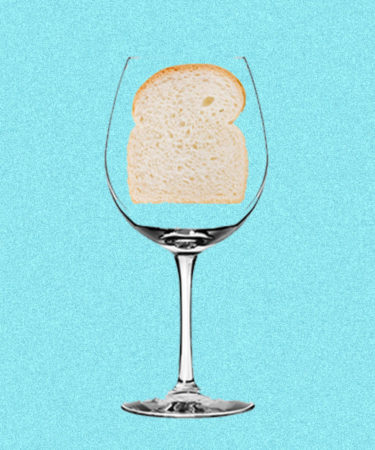Try as you may, there is no way to get around the fact that wine has carbohydrates. While it may not be as obvious in comparison to, say, a piece of white bread, wine has its share of carbohydrates, with the amount depending on the style. Some wines, like Pinot Noir and Sauvignon Blanc, are very low in carbohydrates, containing about five grams or less per serving. Others can have as many carbs as a large potato.
“Wine is naturally pretty low-carb,” says Amanda Thomson, founder and CEO of Thomson & Scott, a sparkling wine brand that makes organic, “vegan-friendly” alcoholic and non-alcoholic wines that avoid unnecessary sugar. However, she adds, “Due to complex labelling laws and rules that vary greatly across the world, it’s tricky to find labels that give you a clear understanding of this, which is frustrating for consumers.”
We asked wine industry professionals everything you need to know about about carbs in wine, including how they get in the glass, how to shop for low-carb wine, and what to sip for the least amount of carbs (hint: it has bubbles!).
1. Where do carbohydrates in wine come from?
A result of the winemaking process, carbohydrates come from the natural sugar present in wine that remains unfermented. This process differs according to the wine that is being made — for example, a wine fermented for less time will have fewer carbs in the finished product than a wine that has been fermenting longer.
2. How can you tell how many carbs are in wine?
“The higher the alcohol by volume, the higher the carbs,” Gus Vizgirda, winemaker at Wilson Creek Winery in Temecula Valley, Calif., says. The same is true for sweetness. “[T]he sweeter the wine, the higher the carbs,” he says.
While dry, off-dry, and sparkling wines can contain less than five grams of carbs per 5-ounce pour, a late-harvest Riesling or tawny port can contain as many as 20 grams of carbs in the very same pour. Industry experts note that if you know a little bit about wine, you will be able to figure out the best choice when shopping for a bottle or ordering a glass.
3. What’s the best style of wine to drink if I’m watching my carbs?
According to Jon McDaniel, sommelier and founder of Chicago-based Second City Soil, the best type of wine to drink when you’re limiting carbohydrate intake is dry wine. In fact, the drier the better, he says.
“The general rule is that the drier the wine, the [fewer carbs] you will have in your glass. So, if you are a fan of white wine, lighter, drier whites like Sauvignon Blanc, Verdicchio, and southern Italian whites are going to be lower in carbs than, say, a Riesling or Chardonnay,” he says.
For reds, Pinot Noir, particularly from Oregon or France, is typically going to have the least amount of carbs, he says. If you’re really being strict, McDaniel suggests avoiding red wines in general, as these wines inherently have more carbohydrates than white wines.
4. Are there wine brands for diet plans like keto or Paleo?
While some people may look to wines that are modified to fit a low- or no-carb diet, like keto or Paleo, or wish to find wine with less sugar to fit a diabetic diet, McDaniel says your best bet is to stay away from them.
“There are a lot of gimmicks out there talking about the best wine for certain diets marketed specifically to these consumers. The reality is that some of these wines are altered in a lab to remove sugars and also remove taste,” he says.
Instead, experts suggest planning to spend a bit more money on regular wine. Those below the $12 mark are often higher-carb due to increased sugar used in the fermentation process (even if they are labeled “dry.”)
5. Does organic wine have fewer carbs?
The short answer is no. However, McDaniel notes, there is a caveat: “More mass-produced wines, wines with funny critters on them and such, tend to use more harmful chemicals in their vineyards to help with increasing their crop and they will also add sugar, sulfites, and other chemicals to their wine in the cellar, which will, of course, increase the amount of carbs in your final glass,” he says.
6. Is it true Champagne is lower-carb than regular wine?
Finally, some good news: “Typically, sparkling wine like Champagne (look for extra brut) has virtually no carbs,” McDaniel says.
7. Is rosé wine lower-carb than red wine?
More good news: According to McDaniel, “rosé from Provence, like Château de Berne, has about half the carbs of a glass of red wine.”
8. Does dosage make a difference?
Yes. A wine with a lower dosage may not eliminate carbs completely, but Thomson says that a low- or no-dosage wine or extra brut Champagne will only contain about 1.5 grams of carbohydrates per glass.
9. Is non-alcoholic wine carb-free?
No. The fermentation process is the same in non-alcoholic wine, which has its alcohol removed afterward either by reverse osmosis or vacuum distillation. As such, the carb count does not change.
10. Are there any hacks for cutting down on carbs while still being able to enjoy wine?
As a matter of fact, there are, says Vizgirda of Wilson Creek Winery. Although, some wine drinkers may not like the answer. “Drink less or mix the wine with soda water,” Vizgirdia says. “The less you drink, the [fewer] carbs you take in.”
